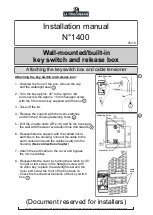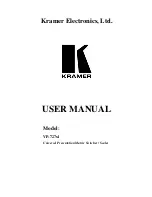
xStack Gigabit Layer 3 Switch Command Line Interface Manual
Priority: 1 DR State: DR
DR Address: 123.234.12.34 Backup DR Address: None
Hello Interval: 10 Dead Interval: 40
Transmit Delay: 1 Retransmit Time: 5
Authentication: None
Total Entries: 2
DGS-3324SRi:4#
create ospf virtual_link
Purpose
Used to create an OSPF virtual interface.
Syntax
create ospf virtual_link <area_id> <neighbor_id>
{hello_interval <sec 1-65535> | dead_interval <sec 1-65535> |
authentication [none | simple <password 8> | md5 <key_id 1-
255>]}
Description
This command is used to create an OSPF virtual interface.
Parameters
<area_id>
−
A 32-bit number in the form of an IP address
(xxx.xxx.xxx.xxx) that uniquely identifies the OSPF area in the
OSPF domain.
<neighbor_id>
−
The OSPF router ID for the remote area. This is
a 32-bit number in the form of an IP address (xxx.xxx.xxx.xxx)
that uniquely identifies the remote area’s Area Border Router.
The router ID of the neighbor router.
hello_interval <sec 1-65535>
−
Allows the specification of the
interval between the transmission of OSPF Hello packets, in
seconds. Between 1 and 65535 seconds can be specified. The
Hello Interval, Dead Interval, Authorization Type, and
Authorization Key should be the same for all routers on the same
network.
dead_interval <sec 1-65535>
−
Allows the specification of the
length of time between the receipt of Hello packets from a
neighbor router before the selected area declares that router
down. An interval between 1 and 65535 seconds can be
specified. The Dead Interval must be evenly divisible by the Hello
Interval.
authentication
– Enter the type of authentication preferred. The
user may choose between:
Restrictions
•
none
– Choosing this parameter will require no
authentication.
•
simple <password 8>
−
Choosing this parameter will set a
simple authentication which includes a case-sensitive
password of no more than 8 characters.
•
md5 <key_id 1-255>
−
Choosing this parameter will set
authentication based on md5 encryption. A previously
configured MD5 key ID (1 to 255) is required.
Only
administrator-level users can issue this command.
Usage Example
326
















































